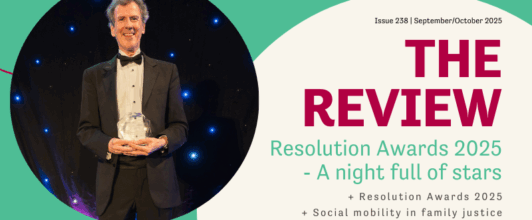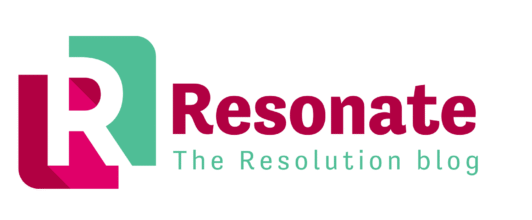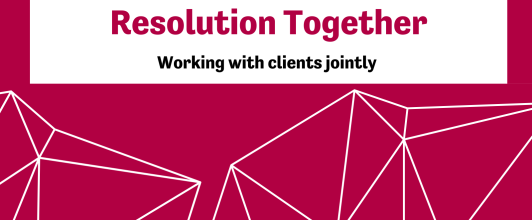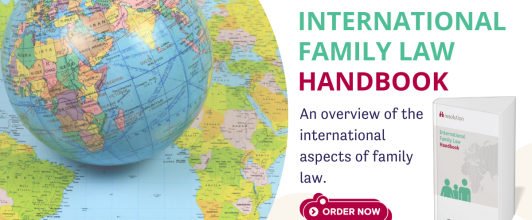
The Review
The Review is Resolution's bi-monthly magazine for members. Publishing six times a year with a mix of features, law and practice and news from the regions.
Broad range of information for professionals and practitioners in family law and justice.
Showing 121 - 140 of 518

The Review is Resolution's bi-monthly magazine for members. Publishing six times a year with a mix of features, law and practice and news from the regions.

Resonate is a new blog from Resolution, bringing together voices from across family law to share insight, experience and both personal and professional perspectives
As part of Resolution's Code of Practice members are asked to use the Good Practice Guides as part of their day to day work. These represent Resolution's core values and are designed to offer knowledge and guidance to our members.

Resolution Together is a way of working that allows lawyers to work with and advise couples jointly, including providing appropriate legal advice, through a divorce or separation.

Find resources on mediation, collaborative practice, arbitration and more.

This list of recommendations of family lawyers in other jurisdictions has been compiled by the members of Resolution's International Committee based on their working experience. The lawyers on this list are not Resolution members - unless indicated - and as such are not endorsed or recommended by Resolution.
LawCare has released findings showing legal professionals at high risk of burnout, with 69% having experienced mental ill-health, and one in five bullied, harassed or discriminated against at work.
A combination of circumstances and pressures led one family lawyer to shift over entirely to mediation. So how has it worked out?
Just as Resolution was surveying members on the future of family practice, Irwin Mitchell asked 1,000 divorcees about their experiences. Both surveys pointed rather dramatically in the direction of non-court dispute resolution processes…
The essence of good Resolution family practice is to assist people through their family dispute in a way that best serves their personal and family interests, especially if there are children involved.
Diwali or Deepawali (latter meaning “row of lighted lamps in Sanskrit) is one of the major festivals celebrated by Hindus, Jains and Sikhs (Bandi Chhor Divas) and Newar Buddhists. Each have their differing beliefs, rituals and regionally across India, the worship of different deities to mark the occasion. It is one of the social festivals of India that has an array of other national and dharmic festivals for celebration.
We hope the Innovation Group’s Modern Work survey will give members an opportunity to pick up ideas or learn from the changes others are making, and also identify areas and ways of working which they may prefer to focus on.
Cohabiting couples currently have little legal protection when they separate. A legal framework of rights and responsibilities when couples (not married or civil partnered) who live together split up is needed to provide some legal protection and secure fair outcomes at the time of a couple’s separation.
For every issue of The Review we will be publishing the articles here in the Knowledge and Resources section of our website as well as the pdf of the printed version.
The Review catches up with… Cris McCurley of Ben Hoare Bell, who won the Family Award at this year’s Legal Aid Lawyer of the Year Awards, which Resolution was proud to sponsor. Cris is an expert in forced marriage, honour-based violence and FGM cases, and is described as the “go-to” solicitor for multiple charities supporting victims of domestic abuse. Resolution would also like to commend the runners up: Novlet Levy and Oliver Conway.
Mediators clearly have a great deal of influence over the structure and conduct of the negotiation process. So what happens if they get it wrong?
The rules around pension sharing orders are complex and fraught with risk…
AEOs can be powerful tools to ensure payment so maintenance, but the exact rules are rigid and need to be followed carefully.
In Derhalli v Derhalli [2021] unexpected developments in the housing market pending sale of the FMH could not change the fundamentals of an already-agreed consent order.
ND (by her litigation friend KW) v GD [2021] EWFC 53 saw the court – in circumstances of a party’s declining health – assess the appropriateness of a clean break, the factors to taken into account when assessing needs, and the source of the family wealth.
16 February 1984: Torvill and Dean had just won gold at the Winter Olympics in Sarajevo, and Frankie Goes to Hollywood’s “Relax” was continuing its five-week reign at number one. The then Attorney-General Sir Michael Havers was also addressing the Commons as to what would become Part III of the Matrimonial and Family Proceedings Act (MFPA).
Mostyn J has raised the spectre of a Supreme Court reconsideration of financial claims following the death of a party.
Re H-N & ors provides a very useful steer on a number of significant issues in children proceedings where allegations of domestic abuse are made.
As international and post-Brexit issues become ever more important for family practitioners, those who missed this workshop at the National Conference may well wish to seek it out on the members website. Resolution’s International Committee cantered through the key issues: divorce and finances jurisdiction/stays, pre-marital agreements, recognition and enforcement issues, children jurisdiction and international service.
Two recent cases have seen the courts grapple with difficult issues concerning puberty blockers.
With the pandemic increasing the number of emails sent directly to judges, it is crucial to remember the rules and principles that apply in this area.